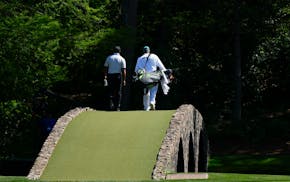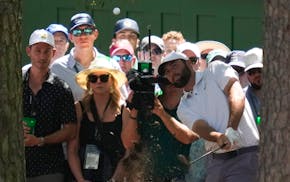I first met Justin Morneau by accident, in the Twins' offices in the Metrodome, shortly after the team drafted him. This was in 1999, when the Twins were casual enough to allow a writer to occasionally wander into the wrong place at the right time.
Someone introduced me to Morneau, a third-round pick. He looked overwhelmed. He seemed to have trouble forming sentences. He was tall, rawboned yet skinny. He looked much more like the former hockey goalie he was than the future big-league star he would become.
His story in Minnesota is that of two transformations, one the result of determination, one the result of hard luck.
The first transformation changed him from an awkward kid and unpolished prospect, the kind of guy Torii Hunter wanted to punch, into a mature star, the kind of guy Hunter still praises. The second transformation prevented Morneau from becoming one of the five greatest Twins of all time.
In the wake of the trade that sent him to the Pirates for a mediocre prospect, Morneau should be remembered more for what he did for the Twins than for what one knee did to his career.
By midsummer of 2010, Morneau had made himself into one of the best players in the game. He had been named to four straight All-Star games, had won the American League MVP award in 2006 and finished second in the voting in 2008.
As good as he was in '06, Morneau was better in 2010.
On July 7 of that year the proud Canadian was enjoying his usual hero's welcome to Toronto. He had earned it. He was hitting .345 with 18 homers and 56 RBI. In '06, his combined on-base percentage and slugging percentage (OPS) was .934. In 2010 it was a stunning 1.055. Last year Miguel Cabrera, the best hitter in the game, won the MVP award and the Triple Crown with an OPS of .999.
That day in Toronto, Morneau slid hard into second base, trying to break up a double play. The play was typical of his career. He swung the bat like a slugger unconcerned with the health of his lower back. He ran the bases and fielded like a utility player grateful for the playing time.
During that slide, Blue Jays infielder John McDonald accidentally clipped Morneau's head with his knee. Morneau did not play again that season. The man who took pride in playing in 163 regular-season games in 2008, thanks to the Twins' one-game tiebreaker, and who averaged 159 regular-season games a year from 2006-2008, played in only 69 games the next year.
His OPS in the last three seasons: a career-low .618, .773 and .741.
From 2006 through 2009, Morneau averaged about 30 homers and 118 RBI. In 2010, he became a more complete hitter, as willing to slash a double to left-center as pull a pitch into the right field stands. One of baseball's best hitters was still getting better.
Had he avoided McDonald's knee, Morneau might be nearing 300 home runs at the age of 32, might own a streak of seven straight All-Star appearances. Maybe he would have won another MVP award in 2010. Babe Ruth won only one. Only 10 players in history have won more than two.
Early in his career, Morneau often swung and missed by a matter of feet, and he could turn a routine ground ball into a spontaneous game of hackey-sack. He learned discipline at the plate, and, with the help of an early-morning spring training regimen with former Twins manager Tom Kelly, turned himself into an excellent fielder.
Morneau shed his shy persona and endeared himself to fans and Twins employees with his humility and thoughtfulness. He was the guy in the clubhouse you wanted to talk to about Joe Mauer's swing or Harmon Killebrew's passing.
Morneau was a self-made star undone by a bump to the head.
This is a good time to remember the good times, and to hope there are more ahead.
Jim Souhan can be heard weekdays at noon and Sundays from 10 to noon on 1500 ESPN. His Twitter name is @SouhanStrib. • jsouhan@startribune.com

Souhan: Why Tiger Woods should keep swinging
Souhan: Scheffler wins Masters again, shows what makes him special
Morikawa falters in final round at Masters

Keeping up with the Joneses who helped design Augusta National's classic back nine

